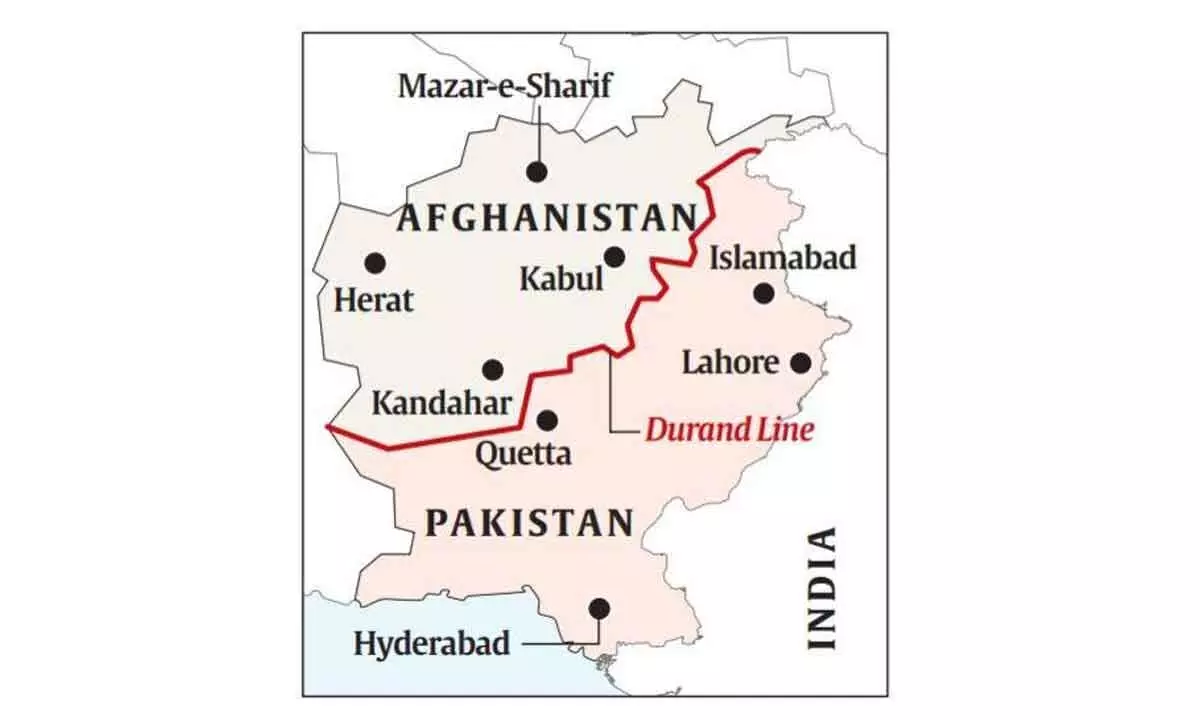Islamabad & Talibment collision can be detrimental to Pakistan
Talibment has become a “strategic libaility” for Pakistan, and Islamabad has intrinsic value for the Taliban
image for illustrative purpose

The Durand line, which forms the international border between Afghanistan-Pakistan Border, has turned into a battleground between the Pakistani Armed Forces and the current Taliban establishment in Kabul.
A series of serious clashes have erupted between the two forces since ‘Talibment’ (undemocratic Taliban establishment) took over Afghanistan in August 2021. In recent weeks, the situation has become brutal. One can estimate the gravity of the problem by reading into the recent warning issued by Pakistan’s defence minister, Khawaja Asif. In an exclusive interview with Voice of America, the Minister stated, “Islamabad will strike terrorist hideouts inside Afghanistan if the de facto rulers in Kabul are unable to rein in anti-Pakistan militants.”
History of Durand Line
The Durand Line is a 2,670-kilometre international land border between Afghanistan and Pakistan, which on the western end runs to the border with Iran and the eastern end to the border Gilgit-Baltistan in POK. In 1893 Sir Henry Mortimer Durand, as foreign secretary of the British Government, drew up a line to demarcate respective spheres of influence between Afghanistan and British India.
Successive Afghan governments, including the Taliban, have not accepted the Durand Line as its border since 1947, as the Afghans believe that the line has divided villages, families and land. The line, also called the ‘line of hatred,’ is described as an arbitrary, illogical, cruel and trickery on the Pashtuns that has split the population, with one part living in Afghanistan and a portion in Pakistan areas.
The tribal areas of Khyber Pakhtunkhwa, along the Durand line, in Pakistan, have more than 20 million Pashtu-speaking people. The vast majority inhabit the plains of Khyber Pakhtunkhwa (KP), while a minority (around 10 per cent) live in the highlands of the semi-autonomous Federally Administered Tribal Areas (FATA).
Why the Flare-up?
It is a known fact that Pakistan’s establishment played a critical role in the return of the Taliban to Afghanistan following a military offensive by the Taliban insurgent group and allied militants that led to the fall of Kabul. The infamous visit by the former Pakistan military spy chief, the then director general of Pakistan’s Inter-Services Intelligence agency, Faiz Hameed, to Kabul, after the fall of the democratically elected government in Afghanistan -proved Pakistan’s role in the ongoing Afghan saga. That probably was the last bonhomie between the two sides since then - the relationship has gone down south.
In the past 20-odd months, the two establishments have clashed, resulting in the loss of life and souring relationships between Kabul and Islamabad. On numerous occasions, the Taliban militants have prevented Pak soldiers from erecting check posts and pulled down border fences erected by Pakistan along the line. As a result, today, the Durand line has become more militarily active than the Line of Control (LoC) between India and Pakistan.
Pakistan has seen an increase in terror attacks across the country too. According to the Islamabad-based Pakistan Institute for Peace Studies, Pakistan recorded at least 262 terror attacks in 2022. The Pakistan establishment has squarely blamed Tehreek-e-Taliban Pakistan, or the TTP, which it considers as an ideological offshoot and ally of the Afghan Taliban.
After the talks between TTP and Pakistan broke down, the group withdrew its cease-fire in November last year in a one-sided move. Since then, the country has witnessed deadly attacks targeting Pakistan uniformed forces. Islamabad has been alleging that TTP is operating from Afghan soil, and its militants flee across the porous border after attacking Pak forces which the Afghan Taliban leaders have denied.
Today, Pakistan, which finds itself on the verge of civil war due to its ongoing economic crisis, political instability and internal security, is of no intrinsic value to the Afghan Taliban as it was during the mujahideen war during the 1980s. It is visible in how a member of Talibment in Kabul mocked Pakistan when he tweeted a picture of the former Pakistani general AAK Niazi’s 1971 surrender to India in Bangladesh. And the member followed it with a warning that Pakistan could face a similar fate if it tried to launch military operations inside Afghanistan.
Today, the Taliban has become a ‘strategic libaility’ for Pakistan’s stability and security, and there is no immediate solution insight to address this emerging threat. Islamabad and Taliban on a collision course - The fallout can be destructive for Pakistan as Talibment has nothing to lose.
(The author is Founder of My Startup TV)

